In the Dark Read online
Page 10
‘She is my aunt,’ the girl went on. ‘My father and mother died two years ago. I was coming to live with her. She wrote such kind letters; and when I came she met me at a station a long drive away, and when I came to this house she brought me up here and asked me to promise to give half my father’s fortune to missionaries and distressed cats, and when I would not, she locked me up. It is three days since.’
‘Why didn’t you scream?’ asked John.
‘She would have come before anyone else could, and she would have killed me – you know she would. The next day she seemed to have forgotten about the cats and things, and began to talk of lovers and all sorts of strange talk; then I knew she was quite mad. Oh, take me away, take me away!’ She began to cry helplessly.
John looked at me.
‘I suppose I had better fetch the police,’ he said quietly.
Then the woman I held cried out, ‘No, no, you shall marry her, if you will. Oh, John, forgive me, dear! I did it for your sake – because I loved you so – but you never would look at me.’
She suddenly turned and laid her faded face against mine.
‘Dear John, forgive me,’ she said. ‘I’ll be a good sister to you both now.’
‘I shall fetch the police,’ said John before I could speak.
I suppose the shock of her sudden confession – remember how much it meant, and how it explained the mysteries of so many years! – must have caused me to loosen my grasp, for as John spoke the woman suddenly broke from my hands, sprang to the window – I saw her huddled form a moment on the ledge as I sprang after her – then she fell in a heap from the window – we saw her fall – on to the laundry roof, and thence to the ground. She never moved again. When John did at last fetch the police there was nothing for them to do. She was dead.
* * *
I suppose you think that Valeria married my John, and that I spent my life a contented spectator of their happiness. This never seems to have even occurred to either of them. You see, though John did most of the filing, I happened to be the first to enter that room, and Valeria insists that it was I who saved her life. As for me, only one face in the world and one name have ever charmed me. Valeria possessed both. I feel a little hesitation and shyness in stating plainly that it was I, and not my boy John, who married Valeria. She was twenty-three, and I forty-five at the time of our marriage, but I have had no gout since that fateful Easter, and Valeria says I am growing younger. She herself looks older than her years, because the horror of those three days – when she did not know from hour to hour when the madness of killing would seize her gaoler – has left white streaks in the black of her soft hair. Valeria says she could never have loved anyone but me, and to me it seems only that I loved Valeria twenty-five years ago in a dream, now, thank God, fulfilled. I still keep the letter which brought me the only enduring happiness of my life. It is written, as I said, with a curiously blunt instrument in strangely coloured ink. That blunt instrument was a splinter of wood from the old window frame, the brown ink was the blood of my Valeria.
THE VIOLET CAR
Do you know the downs – the wide windy spaces, the rounded shoulders of the hills leaned against the sky, the hollows where farms and homesteads nestle sheltered, with trees round them pressed close and tight as a carnation in a button-hole? On long summer days it is good to lie on the downs, between short turf and pale, clear sky, to smell the wild thyme, and hear the tiny tinkle of the sheep-bells and the song of the skylark. But on winter evenings when the wind is waking up to its work, spitting rain in your eyes, beating the poor, naked trees and shaking the dusk across the hills like a grey pall, then it is better to be by a warm fireside, in one of the farms that lie lonely where shelter is, and oppose their windows glowing with candle light and fire light to the deepening darkness, as faith holds up its love-lamp in the night of sin and sorrow that is life.
I am unaccustomed to literary effort – and I feel that I shall not say what I have to say, or that it will convince you, unless I say it very plainly. I thought I could adorn mystery with pleasant words, prettily arranged. But as I pause to think of what really happened, I see that the plainest word will be the best. I do not know how to weave a plot, nor how to embroider it. It is best not to try. These things happened. I have no skill to add to what happened; nor is any adding of mine needed.
I am a nurse – and I was sent for to go to Charlestown – a mental case. It was November – and the fog was thick in London, so that my cab went at a foot’s pace, so I missed the train by which I should have gone. I sent a telegram to Charlestown, and waited in the dismal waiting room at London Bridge. The time was passed for me by a little child. Its mother, a widow, seemed too crushed to be able to respond to its quick questionings. She answered briefly, and not, as it seemed, to the child’s satisfaction. The child itself presently seemed to perceive that its mother was not, so to speak, available. It leaned back on the wide, dusty seat and yawned. I caught its eye, and smiled. It would not smile, but it looked. I took out of my bag a silk purse, bright with beads and steel tassels, and turned it over and over. Presently, the child slid along the seat and said, ‘Let me’ – After that all was easy. The mother sat with eyes closed. When I rose to go, she opened them and thanked me. The child, clinging, kissed me. Later, I saw them get into a first class carriage in my train. My ticket was a third class one.
I expected, of course, that there would be a conveyance of some sort to meet me at the station – but there was nothing. Nor was there a cab or a fly to be seen. It was by this time nearly dark, and the wind was driving the rain almost horizontally along the unfrequented road that lay beyond the door of the station. I looked out, forlorn and perplexed.
‘Haven’t you engaged a carriage?’ It was the widow lady who spoke.
I explained.
‘My motor will be here directly,’ she said, ‘you’ll let me drive you? Where is it you are going?’
‘Charlestown,’ I said, and as I said it, I was aware of a very odd change in her face. A faint change, but quite unmistakable.
‘Why do you look like that?’ I asked her bluntly. And, of course, she said, ‘Like what?’
‘There’s nothing wrong with the house?’ I said, for that, I found, was what I had taken that faint change to signify; and I was very young, and one has heard tales. ‘No reason why I shouldn’t go there, I mean?’
‘No – oh no—’ she glanced out through the rain, and I knew as well as though she had told me that there was a reason why she should not wish to go there.
‘Don’t trouble,’ I said, ‘it’s very kind of you – but it’s probably out of your way and …’
‘Oh – but I’ll take you – of course I’ll take you,’ she said, and the child said ‘Mother, here comes the car.’
And come it did, though neither of us heard it till the child had spoken. I know nothing of motor cars, and I don’t know the names of any of the parts of them. This was like a brougham – only you got in at the back, as you do in a waggonette; the seats were in the corners, and when the door was shut there was a little seat that pulled up, and the child sat on it between us. And it moved like magic – or like a dream of a train.
We drove quickly through the dark – I could hear the wind screaming, and the wild dashing of the rain against the windows, even through the whirring of the machinery. One could see nothing of the country – only the black night, and the shafts of light from the lamps in front.
After, as it seemed, a very long time, the chauffeur got down and opened a gate. We went through it, and after that the road was very much rougher. We were quite silent in the car, and the child had fallen asleep.
We stopped, and the car stood pulsating, as though it were out of breath, while the chauffeur hauled down my box. It was so dark that I could not see the shape of the house, only the lights in the downstairs windows, and the low-walled front garden faintly revealed by their light and the light of the motor lamps. Yet I felt that it was a fair-sized house, that it w
as surrounded by big trees, and that there was a pond or river close by. In daylight next day I found that all this was so. I have never been able to tell how I knew it that first night, in the dark, but I did know it. Perhaps there was something in the way the rain fell on the trees and on the water. I don’t know.
The chauffeur took my box up a stone path, whereon I got out, and said my goodbyes and thanks.
‘Don’t wait, please, don’t,’ I said. ‘I’m all right now. Thank you a thousand times!’
The car, however, stood pulsating till I had reached the doorstep, then it caught its breath, as it were, throbbed more loudly, turned, and went.
And still the door had not opened. I felt for the knocker, and rapped smartly. Inside the door I was sure I heard whispering. The car light was fast diminishing to a little distant star, and its panting sounded now hardly at all. When it ceased to sound at all, the place was quiet as death. The lights glowed redly from curtained windows, but there was no other sign of life. I wished I had not been in such a hurry to part from my escort, from human companionship, and from the great, solid, competent presence of the motor car.
I knocked again, and this time I followed the knock by a shout.
‘Hullo!’ I cried. ‘Let me in. I’m the nurse!’
There was a pause, such a pause as would allow time for whisperers to exchange glances on the other side of a door.
Then a bolt ground back, a key turned, and the doorway framed no longer cold, wet wood, but light and a welcoming warmth – and faces.
‘Come in, oh, come in,’ said a voice, a woman’s voice, and the voice of a man said: ‘We didn’t know there was anyone there.’
And I had shaken the very door with my knockings!
I went in, blinking at the light, and the man called a servant, and between them they carried my box upstairs.
The woman took my arm and led me into a low, square room, pleasant, homely, and comfortable, with solid mid-Victorian comfort – the kind that expressed itself in rep and mahogany. In the lamplight I turned to look at her. She was small and thin, her hair, her face, and her hands were of the same tint of greyish yellow.
‘Mrs Eldridge?’ I asked.
‘Yes,’ said she, very softly. ‘Oh! I am so glad you’ve come. I hope you won’t be dull here. I hope you’ll stay. I hope I shall be able to make you comfortable.’
She had a gentle, urgent way of speaking that was very winning.
‘I’m sure I shall be very comfortable,’ I said; ‘but it’s I that am to take care of you. Have you been ill long?’
‘It’s not me that’s ill, really,’ she said, ‘it’s him—’
Now, it was Mr Robert Eldridge who had written to engage me to attend on his wife, who was, he said, slightly deranged.
‘I see,’ said I. One must never contradict them, it only aggravates their disorder.
‘The reason …’ she was beginning, when his foot sounded on the stairs, and she fluttered off to get candles and hot water.
He came in and shut the door. A fair-bearded, elderly man, quite ordinary.
‘You’ll take care of her,’ he said. ‘I don’t want her to get talking to people. She fancies things.’
‘What form do the illusions take?’ I asked, prosaically.
‘She thinks I’m mad,’ he said, with a short laugh.
‘It’s a very usual form. Is that all?’
‘It’s about enough. And she can’t hear things that I can hear, see things that I can see, and she can’t smell things. By the way, you didn’t see or hear anything of a motor as you came up, did you?’
‘I came up in a motor car,’ I said shortly. ‘You never sent to meet me, and a lady gave me a lift.’ I was going to explain about my missing the earlier train, when I found that he was not listening to me. He was watching the door. When his wife came in, with a steaming jug in one hand and a flat candlestick in the other, he went towards her, and whispered eagerly. The only words I caught were: ‘She came in a real motor.’
Apparently, to these simple people a motor was as great a novelty as to me. My telegram, by the way, was delivered next morning.
They were very kind to me; they treated me as an honoured guest. When the rain stopped, as it did late the next day, and I was able to go out, I found that Charlestown was a farm, a large farm, but even to my inexperienced eyes it seemed neglected and unprosperous. There was absolutely nothing for me to do but to follow Mrs Eldridge, helping her where I could in her household duties, and to sit with her while she sewed in the homely parlour. When I had been in the house a few days, I began to put together the little things that I had noticed singly, and the life at the farm seemed suddenly to come into focus, as strange surroundings do after a while.
I found that I had noticed that Mr and Mrs Eldridge were very fond of each other, and that it was a fondness, and their way of shewing it was a way that told that they had known sorrow, and had borne it together. That she showed no sign of mental derangement, save in the persistent belief of hers that he was deranged. That the morning found them fairly cheerful; that after the early dinner they seemed to grow more and more depressed; that after the ‘early cup of tea’ – that is just as dusk was falling – they always went for a walk together. That they never asked me to join them in this walk, and that it always took the same direction – across the downs towards the sea. That they always returned from this walk pale and dejected; that she sometimes cried afterwards alone in their bedroom, while he was shut up in the little room they called the office, where he did his accounts, and paid his men’s wages, and where his hunting-crops and guns were kept. After supper, which was early, they always made an effort to be cheerful. I knew that this effort was for my sake, and I knew that each of them thought it was good for the other to make it.
Just as I had known before they showed it to me that Charlestown was surrounded by big trees and had a great pond beside it, so I knew, and in as inexplicable a way, that with these two fear lived. It looked at me out of their eyes. And I knew, too, that this fear was not her fear. I had not been two days in the place before I found that I was beginning to be fond of them both. They were so kind, so gentle, so ordinary, so homely – the kind of people who ought not to have known the name of fear – the kind of people to whom all honest, simple joys should have come by right, and no sorrows but such as come to us all, the death of old friends, and the slow changes of advancing years.
They seemed to belong to the land – to the downs, and the copses, and the old pastures, and the lessening cornfields. I found myself wishing that I, too, belonged to these, that I had been born a farmer’s daughter. All the stress and struggle of cram and exam, of school, and college, and hospital, seemed so loud and futile, compared with these open secrets of the down life. And I felt this the more, as more and more I felt that I must leave it all – that there was, honestly, no work for me here such as for good or ill I had been trained to do.
‘I ought not to stay,’ I said to her one afternoon, as we stood at the open door. It was February now, and the snowdrops were thick in tufts beside the flagged path. ‘You are quite well.’
‘I am,’ she said.
‘You are quite well, both of you,’ I said. ‘I oughtn’t to be taking your money and doing nothing for it.’
‘You’re doing everything,’ she said, ‘you don’t know how much you’re doing.
‘We had a daughter of our own once,’ she added vaguely, and then, after a very long pause, she said very quietly and distinctly:
‘He has never been the same since.’
‘How not the same?’ I asked, turning my face up to the thin February sunshine.
She tapped her wrinkled, yellow-grey forehead, as country people do.
‘Not right here,’ she said.
‘How?’ I asked. ‘Dear Mrs Eldridge, tell me; perhaps I could help somehow.’
Her voice was so sane, so sweet. It had come to this with me, that I did not know which of those two was the one who needed my help
.
‘He sees things that no one else sees, and hears things no one else hears, and smells things that you can’t smell if you’re standing there beside him.’
I remembered with a sudden smile his words to me on the evening of my arrival:
‘She can’t see, or hear, or smell.’
And once more I wondered to which of the two I owed my service.
‘Have you any idea why?’ I asked. She caught at my arm.
‘It was after our Bessie died,’ she said – ‘the very day she was buried. The motor that killed her – they said it was an accident – it was on the Brighton Road. It was a violet colour. They go into mourning for Queens with violet, don’t they?’ she added; ‘and my Bessie, she was a Queen. So the motor was violet. That was all right, wasn’t it?’
I told myself now that I saw that the woman was not normal, and I saw why. It was grief that had turned her brain. There must have been some change in my look, though I ought to have known better, for she said suddenly, ‘No. I’ll not tell you anymore.’
And then he came out. He never left me alone with her for very long. Nor did she ever leave him for very long alone with me.
I did not intend to spy upon them, though I am not sure that my position as nurse to one mentally afflicted would not have justified such spying. But I did not spy. It was chance. I had been to the village to get some blue sewing silk for a blouse I was making, and there was a royal sunset which tempted me to prolong my walk. That was how I found myself on the high downs where they slope to the broken edge of England – the sheer, white cliffs against which the English Channel beats for ever. The furze was in flower, and the skylarks were singing, and my thoughts were with my own life, my own hopes and dreams. So I found that I had struck a road, without knowing when I had struck it. I followed it towards the sea, and quite soon it ceased to be a road, and merged in the pathless turf as a stream sometimes disappears in sand. There was nothing but turf and furze bushes, the song of the skylarks, and beyond the slope that ended at the cliffs edge, the booming of the sea. I turned back, following the road, which defined itself again a few yards back, and presently sank to a lane, deep-banked and bordered with brown hedge stuff. It was there that I came upon them in the dusk. And I heard their voices before I saw them, and before it was possible for them to see me. It was her voice that I heard first.

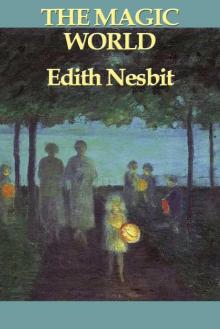 The Magic World
The Magic World In the Dark
In the Dark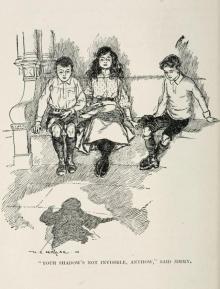 The Enchanted Castle
The Enchanted Castle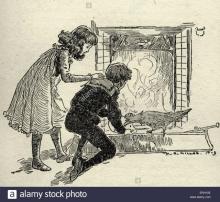 The Phoenix and the Carpet
The Phoenix and the Carpet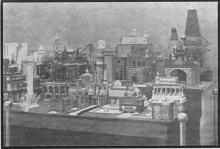 The Magic City
The Magic City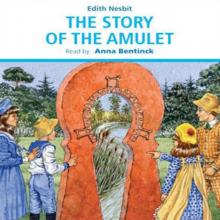 The Story of the Amulet
The Story of the Amulet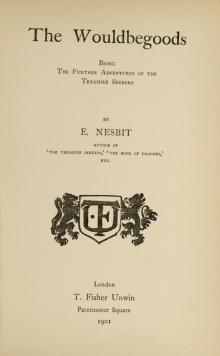 The Wouldbegoods: Being the Further Adventures of the Treasure Seekers
The Wouldbegoods: Being the Further Adventures of the Treasure Seekers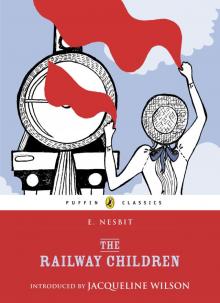 The Railway Children
The Railway Children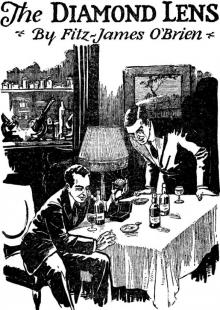 The Diamond Lens
The Diamond Lens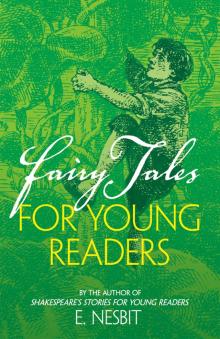 Fairy Tales for Young Readers
Fairy Tales for Young Readers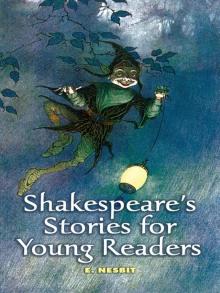 Shakespeare's Stories for Young Readers (Dover Children's Classics)
Shakespeare's Stories for Young Readers (Dover Children's Classics)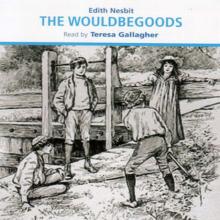 The Wouldbegoods
The Wouldbegoods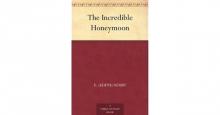 The Incredible Honeymoon
The Incredible Honeymoon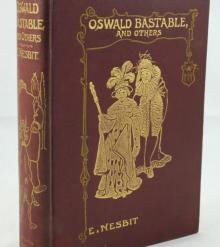 Oswald Bastable and Others
Oswald Bastable and Others Pussy and Doggy Tales
Pussy and Doggy Tales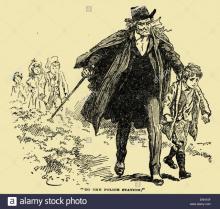 New Treasure Seekers; Or, The Bastable Children in Search of a Fortune
New Treasure Seekers; Or, The Bastable Children in Search of a Fortune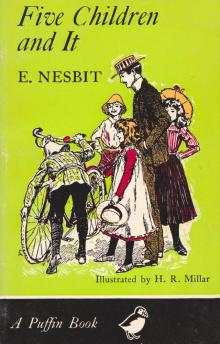 Five Children and It
Five Children and It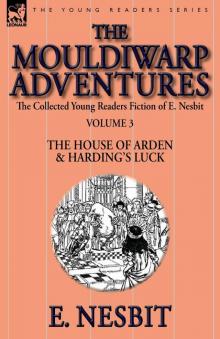 Harding's luck
Harding's luck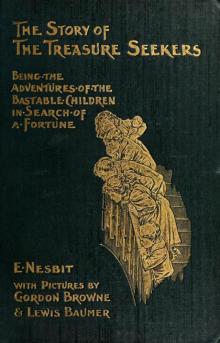 The Story of the Treasure Seekers
The Story of the Treasure Seekers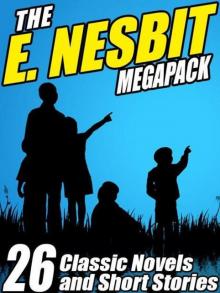 The E. Nesbit Megapack: 26 Classic Novels and Stories
The E. Nesbit Megapack: 26 Classic Novels and Stories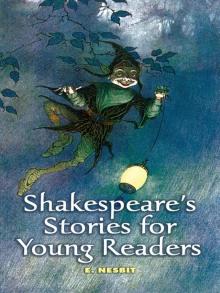 Shakespeare's Stories for Young Readers
Shakespeare's Stories for Young Readers